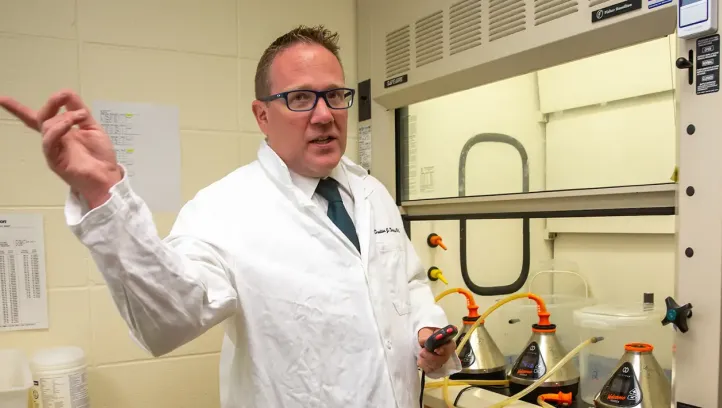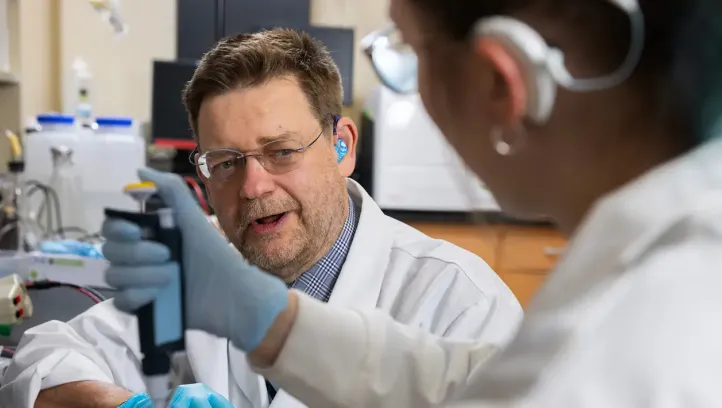
President’s Fund in Population Health: Addressing Loneliness

Special introduction by Scott Shipman, executive director of the Institute for Population Health and CyncHealth Endowed Chair of Population Health
Social isolation and loneliness have been identified as a national public health crisis with recognized negative impacts on individual and community health. It is a problem prevalent in the college-age population, with local data indicating many Creighton students struggle with these issues. Current local interventions to address social isolation and loneliness and to foster a sense of belonging have poor uptake; nationally, relatively few interventions are recognized as both effective and feasible.
The project “Life Together: Seeking What Makes Us Whole,” led by a multidisciplinary team of Creighton researchers, faculty and staff, is working to better measure and understand students’ self-identified levels of depression, anxiety, loneliness and isolation as well as religiosity and sense of connection. The team lead, the Rev. Christopher Krall, SJ, PhD, assistant professor of theology and neuroscience, notes that today’s mindsets have led people away from community.
LIFE TOGETHER: Seeking What Makes Us Whole
In spring 2024, Creighton President the Rev. Daniel S. Hendrickson, SJ, PhD, awarded grants to five projects from a special President’s Fund in Population Health. One project focuses on loneliness and social isolation among college-age students.
A multidisciplinary team working on the project, titled “Life Together: Seeking What Makes Us Whole,” includes researchers, faculty and staff from the Departments of Theology, Psychology, Pharmacy Sciences, and Modern Languages and Literature, along with the Division of Diversity, Equity and Inclusion, Student Life, Campus Ministry, Student Counseling Services, the Violence Intervention and Prevention Center, and The Success Center. The team also hand-selected a group of eight students, two from each undergraduate level, to form a Student Advisory Group for the project.
Pandemic of Loneliness
“It struck us when the Population Health Grants were announced that Creighton University is the perfect place to address the pandemic of loneliness from a psychological/neurological perspective backed by theological depth,” says the Rev. Christopher Krall, SJ, PhD, assistant professor of theology and neuroscience, and team lead. “We started to develop this communal project to build up ‘life together’ as humanity, starting here at Creighton but with vast implications.”
The team designed a psychological survey to measure students’ self-identified levels of depression, anxiety, loneliness and isolation, as well as religiosity and sense of connection. The Student Advisory Group tested the survey, which takes about 30 minutes to complete, and provided feedback so the team could attract students to participate and get the best data about the students’ experience of loneliness as possible. The survey was administered in September.
Fr. Krall will present preliminary data findings during The Baylor Symposium on Faith and Culture: Renewing and Reimagining Institutions for the Common Good, scheduled for Oct. 17-19 in Waco, Texas. The paper's title will be “Institutions as the Needed Third Space: Addressing the Loneliness Pandemic through Faith and Research.”
'Conference of Collaboration'
Fr. Krall says the team will host “The Conference of Collaboration” Nov. 1 from 12:30-2:30 p.m. CT to bring together campus groups and possibly community groups already working to address social isolation and loneliness issues, share preliminary data and receive feedback. The event will be held in Hixson-Lied Science Building, Room G04. A planned panel at the conference will include:
- Becky Nickerson, EdD, senior director of Equity, Diversity and Inclusion, who recently completed her dissertation on the social effects of isolation and loneliness
- Thomas Budesheim, PhD, in the Psychology Department, whose research touches on the psychological effects of chronic loneliness
- Faith Kurtyka, PhD, associate professor of English, whose passions and work involve building the human narrative of belonging and inclusion
“We're hoping for understanding what's already happening — what people have tried that hasn't worked and what people have tried that has worked to address loneliness,” he says.
Fr. Krall said the impetus for this project came from several sources. First, human flourishing has served as his guiding vision in his interdisciplinary research in neuroscience and theology.
“With (U.S. Surgeon General) Dr. Vivek Murthy’s recent advisory statement on the catastrophic issues of chronic loneliness, I recognized that isolation and loneliness are more than a physiological issue,” Fr. Krall says. “Theological understandings of the human person, such as being made in the image and likeness of a trinitarian, communal God, now, through this pandemic of loneliness, have become physically manifest. The cura personalis requires care in both the physical and spiritual/theological aspects of us.”
Second, he continues, were discussions he had with Creighton colleagues Ted Dedon, PhD, an assistant professor of theology, and Tricia Ross, PhD, a scholar on the history of science and religion and an associate professor in the Department of Modern Languages and Literatures and the Honors Program, about “reading the signs of the times” a phrase developed during the Second Vatican Council, and what makes the teachings of the Church relevant today.
“Through encyclicals and council documents, Trish, Ted and I started to recognize connections between the issues of isolation so present in our culture, especially college-age students, and the teachings of the Church,” Fr. Krall says. “Amid these discussions, we all had further discussions with colleagues around the campus and were excited to hear how Creighton Student Life, Student Counseling Services, Campus Ministry and Student Success are already working to address these issues within the student body.”
In addition to Fr. Krall, Dedon and Ross, the team includes Amy Badura Brack, PhD, professor of psychological science, College of Arts and Sciences; Robby Francis, director of Campus Ministry; Kevin Fuji, PharmD, MA, associate professor of pharmacy sciences, School of Pharmacy and Health Professions; Katie (Kelsey) Becker, EdD, senior director for donor relations and annual giving, University Relations, ; Nickerson, from Division of Diversity, Equity and Inclusion; Jennifer Peter, PsyD, licensed clinical psychologist in Student Counseling Services and senior director of the Violence Intervention and Prevention Center; Mary Ann Tietjen, EdD, senior director of The Success Center.




